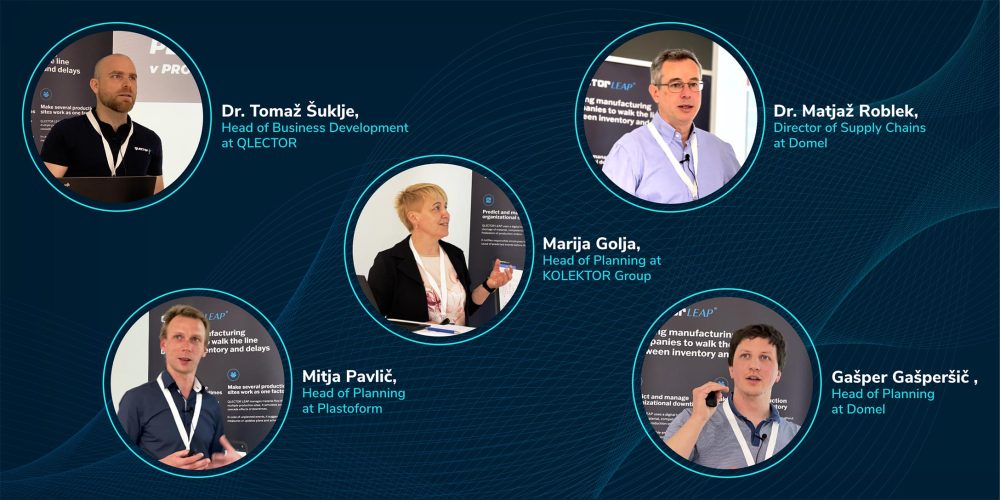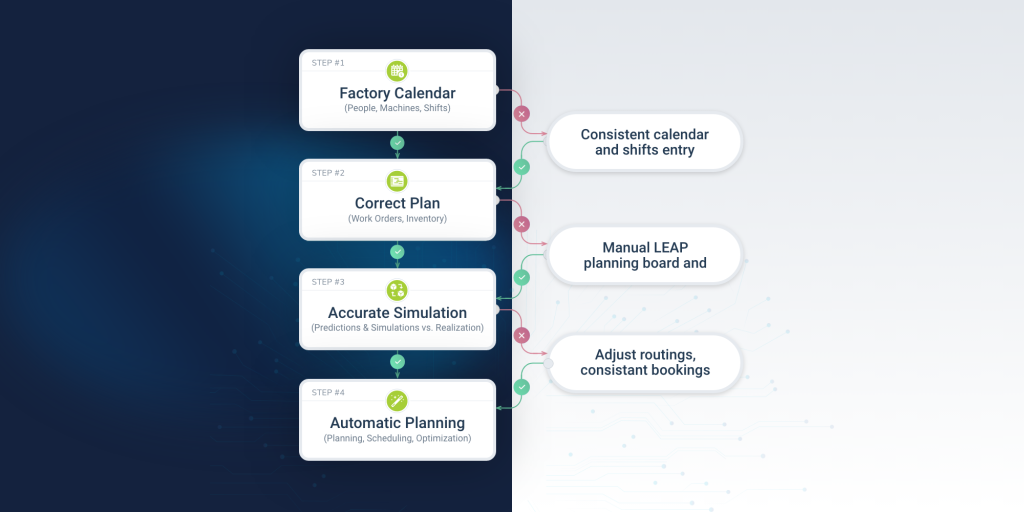What are the best practices in Slovenian manufacturing companies in deploying and using advanced planning and scheduling (APS) tools? How can we create a space for experience and knowledge sharing for production planning experts? And finally – are we as companies mature enough to implement artificial intelligence in production planning processes? We successfully answered all these questions at the Qlector’s seminar organized in cooperation with partners from Domel, Kolektor and Plastoform Šmarjeta.
Prerequisites for the use of AI in manufacturing
At the same time, companies are wondering which combination of tools is best for them and whether they are mature enough to use AI in production planning, said Tomaž Šuklje, Head of Business Development at QLECTOR in his opening speech. In his experience, the most important prerequisites for the use of AI in manufacturing companies are a suitable corporate strategy for digitization and the establishment of a data structure, management support for the introduction of new technologies, an orderly workflow in the ERP system and consistent recording of the realization.
Pilot project for demanding production facilities
According to Matjaž Roblek, Director of Supply Chain at Domel, a complex production plant with demanding challenges was selected for the pilot implementation of the Qlector LEAP production guiding solution. In its search for a suitable APS tool on the market, the company was driven by the need to increase productivity, make better use of resources, and increase value added per employee.
Biggest challenges related to uncertainty
Before implementing Qlector LEAP, all business processes were first thoroughly analyzed. It turned out that the biggest operational challenges were related to uncertainty. Uncertainty existed at the technical and development level as well as in sales, production, planning, and supply chain. After running through various scenarios, it was decided to try to predict these uncertainties as much as possible and prepare well for their consequences.
Not only planning, but also predicting
The Qlector LEAP has met these challenges well. Domel users are satisfied because it allows them not only to plan, but also to predict. They also appreciate the independent master database, which can overcome the challenges of low quality ERP master data and the constant adjustment of the algorithm.
Significant reduction in workload
As Matjaž Roblek pointed out, the implementation of Qlector LEAP has also led to a significant reduction in the workload for technologists. They can now plan much more easily, as they can review inventory status and coverage with input materials in SAP. Machine learning technology has also enabled them to predict production durations more realistically. And with the help of genetic algorithms and combinatorics, they can now really optimize scheduling.
The main added value was created by people
Ultimately, however, the main added value was created by the people who successfully participated in the pilot project. “The Qlector team understood our needs very well and was extremely responsive, so in the end we acted as one very well-coordinated development team,” concluded Matjaž Roblek.
Challenges during implementation
Gašper Gašperšič, Head of Planning Department, presented the implementation of Qlector LEAPin Domel’s production in more detail. He pointed out that the company faced informational, organizational and strategic challenges that were discovered and solved during the implementation.
Significant time and energy savings
In terms of user experience, Gašperšič emphasized that planners have been able to achieve significant time and energy savings due to the ability to account for planned and scheduled jobs. They also have a much better overview of the current situation in production and can find solutions faster when the schedule breaks down. They can also quickly check and compare different scenarios and create accurate order confirmations for internal and external customers.
From inefficient and stressful planning …
Similar benefits and savings from implementing APS tools are being realized at Plastoform Šmarjeta. As the head of the planning department, Mitja Pavlič, pointed out, before implementing the Siemens Opcenter (Preactor) solution, the company was faced with inefficient and stressful planning, data clutter, and scheduling based on an “I think, I know” attitude.
… to improved communication and easier work
Today, the planning department, responsible for 2,000 products and 124 employees in three shifts, has significantly less stress thanks to improved communication and easier work. Thanks to Preactor’s forecasting capabilities, they have a better understanding of the future and many options for planning. The organizational flow of production has improved, inventories have been reduced and, most importantly, the company has a realistic overview of all necessary resources.
Improved information flow between the plan and actual production
Marija Golja, Head of the Planning Department, presented her experience with Qlector LEAPin forecasting inter-plant production within the Kolektor Group. In the first phase of the deployment, they improved the flow of information between the plan and actual production. The Gantt chart gave them an excellent visual overview of the plan, showing all the basic information – from line occupancy and capacity utilization to production orders and tool replacement planning.
Accurate prediction for input material requirements
A detailed plan with all shifts is also very useful. It shows products and production orders and allows planners to manage overtime or exclude production orders in case of cancellation. With insights into inventory, it is now much easier and more accurate to plan and forecast input material requirements, including associated production plants at different locations. When assigning employees to shifts, planners in Kolektor can more easily adapt to the actual situation on the store floor, as Qlector LEAP shows them potential staff shortages and informs them of possible limitations or missing skills and competencies.
We invite you to watch a video from this event and learn more about use cases of advanced AI-based planning and scheduling solutions.











